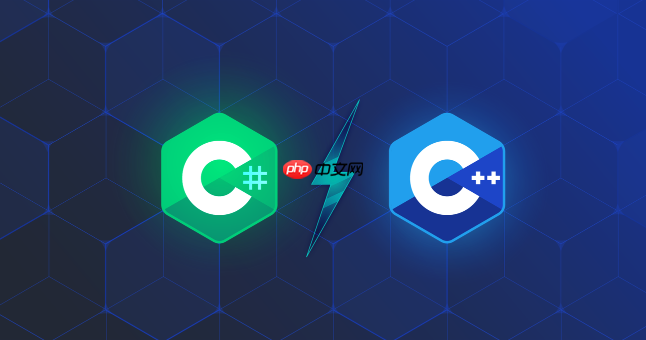使用RAII管理文件资源可防止泄漏,推荐std::fstream类自动关闭文件;自定义FileGuard类管理C风格文件指针,确保异常时释放;写入采用临时文件+原子重命名,保证数据完整性。

在C++中进行文件操作时,如果未正确管理资源,很容易导致文件句柄泄漏、内存泄漏或异常安全问题。尤其是在抛出异常的情况下,传统的
FILE*或
fstream若未妥善处理,可能使程序处于不一致状态。下面通过实例展示如何防护资源泄漏,确保异常安全。使用RAII管理文件资源
RAII(Resource Acquisition Is Initialization)是C++中管理资源的核心机制。对象在构造时获取资源,在析构时自动释放,即使发生异常也能保证资源被正确回收。
推荐使用
std::ifstream、std::ofstream或std::fstream代替C风格的FILE*,因为这些类在析构函数中会自动关闭文件。示例:安全读取文件内容
立即学习“C++免费学习笔记(深入)”;
以下代码即使在读取过程中抛出异常,也能确保文件自动关闭:
#include#include #include #include std::string read_file(const std::string& filename) { std::ifstream file(filename);
if (!file.is_open()) { throw std::runtime_error("无法打开文件: " + filename); } std::string content((std::istreambuf_iterator(file)), std::istreambuf_iterator ()); if (file.fail() && !file.eof()) { throw std::runtime_error("读取文件时出错: " + filename); } return content; // file 在离开作用域时自动关闭 }
在这个例子中,
file是局部对象,其析构函数会在函数返回或异常抛出时自动调用,关闭文件句柄,避免泄漏。自定义资源管理类(适用于复杂场景)
当需要管理非标准资源(如多个文件、共享句柄等),可封装自定义RAII类。
例如,管理一个C风格文件指针:
class FileGuard { FILE* fp; public: explicit FileGuard(FILE* f) : fp(f) {}~FileGuard() { if (fp) { std::fclose(fp); } } FILE* get() const { return fp; } // 禁止拷贝,防止重复释放 FileGuard(const FileGuard&) = delete; FileGuard& operator=(const FileGuard&) = delete; // 允许移动 FileGuard(FileGuard&& other) : fp(other.fp) { other.fp = nullptr; }};
使用示例:
std::string read_with_cfile(const std::string& filename) { FILE* fp = std::fopen(filename.c_str(), "r"); if (!fp) { throw std::runtime_error("fopen 失败"); }FileGuard guard(fp); // 自动管理生命周期 char buffer[1024]; std::string content; while (std::fgets(buffer, sizeof(buffer), fp)) { content += buffer; // 假设此处可能抛出异常(如内存不足) } return content; // guard 析构时自动 fclose}
即使
content += buffer抛出std::bad_alloc,guard仍会正确释放文件句柄。异常安全的写入操作
写入文件时,应避免在写入中途异常导致文件损坏或句柄未关闭。使用临时文件+原子重命名是常用策略。
示例:安全写入配置文件
void write_config_safe(const std::string& filename, const std::string& data) { std::string tmp_filename = filename + ".tmp"; std::ofstream file(tmp_filename);if (!file) { throw std::runtime_error("无法创建临时文件"); } file zuojiankuohaophpcnzuojiankuohaophpcn data; if (!file) { throw std::runtime_error("写入失败"); } file.close(); if (!file) { throw std::runtime_error("关闭文件失败"); } // 原子重命名(POSIX)或尽量原子 if (std::rename(tmp_filename.c_str(), filename.c_str()) != 0) { std::remove(tmp_filename.c_str()); // 清理临时文件 throw std::runtime_error("重命名失败"); }}
该方法确保原文件在写入完成前不受影响,即使程序崩溃,原始文件仍完整。
关键防护建议总结
- 优先使用
std::fstream系列类:它们自带RAII,无需手动关闭。- 避免裸资源操作:如直接使用
fopen/fclose,应配合RAII封装。- 异常安全三原则:不泄漏资源、不破坏数据、保持对象状态一致。
- 临时文件+重命名:用于关键数据写入,防止写入中断导致数据损坏。
- 始终检查IO状态:使用
is_open()、fail()、eof()等判断操作结果。基本上就这些。C++的异常安全依赖于良好的资源管理习惯,RAII是核心手段。只要确保每个资源都由对象管理,就能有效防止文件操作中的资源泄漏问题。






























